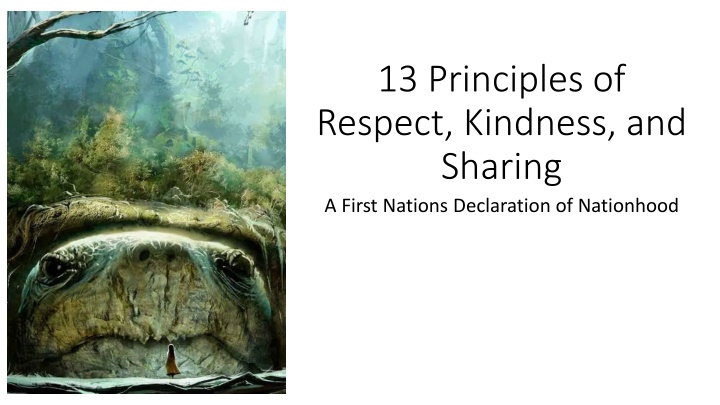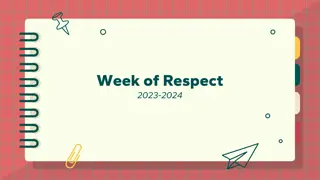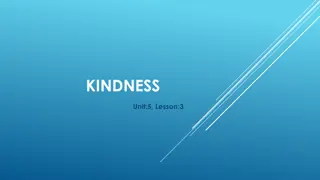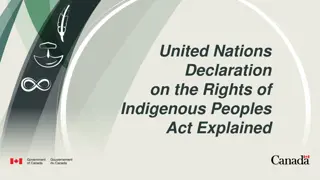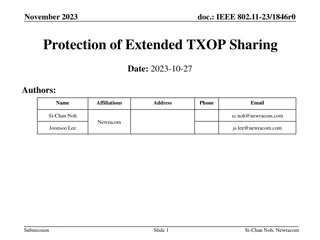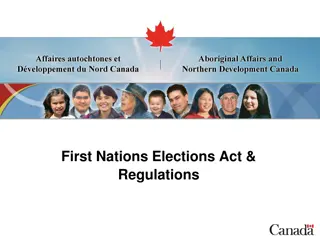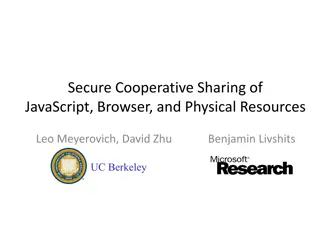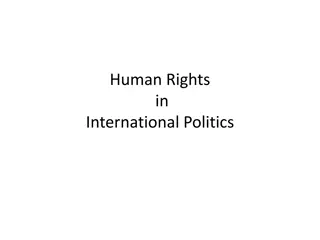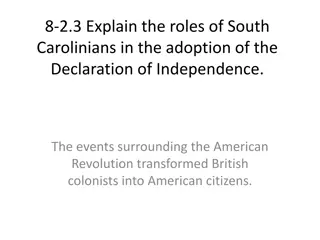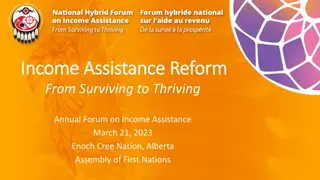Principles of Respect, Kindness, and Sharing: A First Nations Declaration
In this declaration, the author emphasizes the responsibility of First Nations as caretakers of their ancestral lands. It discusses the historical exclusion of First Peoples in the formation of Canada and calls for the recognition and preservation of Indigenous rights and sovereignty. The text highlights the importance of decolonization led by First Peoples and Nations, advocating for the upholding of inherent rights and jurisdictions.
Download Presentation

Please find below an Image/Link to download the presentation.
The content on the website is provided AS IS for your information and personal use only. It may not be sold, licensed, or shared on other websites without obtaining consent from the author.If you encounter any issues during the download, it is possible that the publisher has removed the file from their server.
You are allowed to download the files provided on this website for personal or commercial use, subject to the condition that they are used lawfully. All files are the property of their respective owners.
The content on the website is provided AS IS for your information and personal use only. It may not be sold, licensed, or shared on other websites without obtaining consent from the author.
E N D
Presentation Transcript
13 Principles of Respect, Kindness, and Sharing A First Nations Declaration of Nationhood
From the earliest times we have always made it clear that we know it was the intent of Creation that all peoples were created in their ancestral places for the specific purposes of being the caretakers and custodians of those places. Through that deliberate placement of our nations and peoples on this part of Turtle Island we were conferred a never ending responsibility that in English we could only equate to sovereignty . - Author Unknown
Introduction It has been approximately 150 years since the new colonists engaged in a debate about creating a nation, whether it be a through a union of partially self-governing provinces or strong central government. They began to divide land amongst themselves and discussed ways of distributing power to achieve their vision of a united Canada. Unfortunately, First Nations Peoples and Nations were not included in this debate. On the contrary, the debate was centred on how to eliminate First Peoples and Nations with the expressed purpose of accessing their land and resources in the spirit Terra Nullius and the Doctrine of Discovery. To consolidate power and solve the Indian Problem , Canada sought the domestication of their relationship with First Peoples and Nations. This process included taking issues that originally belonged to the realm of international law (e.g. treaties, nation-to-nation relationships, etc.) by making them subject solely to domestic legislation unilaterally passed by Canada and adjudicated by domestic non-indigenous courts. The Indian Act, the Comprehensive Claims Policy, the Inherent Right Policy, and court decisions such as Sparrow, Van der Peet, Pamajewon, and Delgamuukw are all extensions of the domestication process. The Recognition and Implementation of Indigenous Rights Framework is the most recent iteration of domestication put forward by the Federal Government.
1. Only First Peoples and Nations Can Determine the Processes of Decolonization When Canada and the Crown began refusing to adhere to the principles and terms of the treaties faithfully negotiated with First Peoples and Nations, an oppressive and colonial regime emerged. As the oppressors, Canada and the Crown cannot determine the processes for repairing the damage done to First Peoples and Nations. They continue to operate within two-hundred-year-old colonial structures and ideologies that are responsible for assimilation and the domestication of international Treaties in order to solve the Indian Problem . First Peoples and Nations have the capacity and capability to lead the processes of decolonization.
2. First Peoples and Nations Continue to Uphold their Sovereign Inherent Rights and Jurisdictions First Peoples and Nations government institutions have the right to exercise their inherent rights unfettered by colonial encroachment. These sovereign rights include, but are not limited to: Selection of leadership Exercise of Laws given to First Peoples by the Creator (i.e. honouring our cultural diversity, languages, ceremony, and creation stories) The authority to determine citizenship and portability of rights The authority to enter into relations with other states Land rights, including management of resources
3. A Sacred Trust: First Peoples and Nations Continue to Uphold their Inherent Rights and Never-Ending Responsibilities to their Lands and Resources First Peoples and Nations have a permanent responsibility to protect their lands and have the right to benefit from them in accordance with the Seven Generations teachings. Rights derived from underlying title include: Economic rights (including the right to resource development, trade and commerce, and to engage freely in traditional and other economic activities) Conservation and protection of the environment and the productive capacity of their lands and resources Surface and subsurface rights Water rights including personal and economic use and navigation First Nations sovereignty over their natural wealth and resources must be exercised in the interest of their national development and the well-being of their people, as per their treaty relations.
4. Reparations to First Peoples and Nations: Redress from Canada for Past Harms and the Continued Disruption of their Social, Cultural, Political, and Economic Ways of Life Reparations for the resources that Canada has taken and continues to take from their lands and territories. Reparations, including return of lands and resources, necessary to rebuild their nations and participate in economic affairs that surround them. For 150 years of devastation, 2.5 percent of Canada s Gross National Product will be allocated to First Peoples and Nations for 150 years, so they may take their rightful place within their homelands.
5. The Relationship between First Nations and Canada Must be Governed by International Law All international law and UN conventions, including: the International Convention on Social, Economic and Cultural rights, the International Covenant on Civil and Political Rights, the Convention on the Prevention and Punishment of the Crime of Genocide, UN General Assembly Resolution 1803 (XVII) of 14 December, 1962 "Permanent sovereignty over natural resources", the Universal Declaration of Human Rights, the Geneva Conventions, and the Convention of the Rights of the Child continue to apply to the First Peoples and Nations of Turtle Island.
6. International Relations: First Peoples and Nations Maintain the Sovereign Authority to Enter into International Agreements and Relationships Pre-contact, First Peoples and Nations utilized international treaties as a means of peaceful co-existence, commerce, and trade. Though dormant due to oppressive government policy and legislation, First Peoples and Nations maintain the authority, as subjects of international law, to enter into international treaty relationships. Canada has constitutional and international legal obligations (e.g. honour of the crown, the Vienna Convention on the Law of Treaties, etc.) to uphold international treaties.
7. Consent was an Integral Part of the Historical Treaty Process and is Necessary for a True Nation-to-Nation Relationship The diplomatic process of historic treaty-making required that First Peoples and Nations and the Crown mutually bestow upon each other the status of sovereign entities. To make claims to land via derivative title, the Crown required the consent of the legitimate holder of the original title. Neither party to the Treaties can unilaterally change the terms of the agreement or discharge their responsibility to another party. This is supported by the Vienna Convention on the Law of Treaties, 1969. Canada s consultation and engagement processes are not consent. They are one-sided power games where First Peoples and Nations can never win, as national interest and jurisdictional superiority are used to override First Peoples and Nations sovereignty.
8. Only a Permanent International Court Can Arbitrate Disputes between Canada and First Peoples and Nations in a Fair and Impartial Manner Conflicts between First Peoples and Nations and Canada, which are international in nature, are decided by domestic law. This process is fundamentally unjust as it forces First Peoples and Nations into the courts of their colonizer. Mutually agreed upon international dispute resolution mechanisms, that balance the interests of both parties, can be the only acceptable means of arbitration between Canada and First Peoples and Nations. Current examples include free-trade dispute resolution panels, the European Court of Human Rights, and the International Court of Justice (ICJ). Any third-party led mechanism must be empowered with all the tools necessary to achieve a fair resolution. These tools include, but are not limited to: funding for research, the authority to compel parties to come to the table and, when agreed to by both parties, binding arbitration.
9. First Nations Retain the Right to Self-Defense As sovereign nations, First Nations have the right to defend their lands and territories from encroachment by foreign powers as they have done throughout history. The right to self-defence, including the right to combat terror, is a cornerstone of international law, enshrined in the UN Charter (Article 51) and numerous Security Council Resolutions.
10. Constitutional Reform is Necessary to have a Nation- to-Nation Relationship between First Peoples and Nations and Canada The Canadian Constitution has completely failed to protect the relationship between First Peoples and Nations and Canada. It reflects a 200-year-old structure and belief system that sees and treats First Peoples and Nations as inferior to Canadian state institutions. First Peoples and Nations inherent rights and jurisdictions cannot be derived from the Constitution Act, 1982. The Canadian Constitution must be amended to comply with the new nation-to- nation relationship.
11. Clearing the Path: Canada Must Remove Legislation and Court Decisions that Undermine the Rights of First Peoples and Nations All law and policy must conform to the processes of decolonization and the affirmation of the inherent rights of First Peoples and Nations. All policy reform must follow the 13 principles established herein. Canada has the capacity to end the infringement of and limitations to the inherent rights of First Peoples and Nations.
12. Accountability: Canada Must be Held Accountable for the Human Rights Abuses Inflicted upon First Peoples and Nations There has been no accountability for human rights abuses deliberately inflicted upon First Peoples, apologies are insufficient. To account for past harms, human rights tribunals are to be held by third party adjudicators (e.g. the International Criminal Court) under international law, to prosecute crimes against humanity committed by Canada and the Crown. Genocidal acts committed with the intent to destroy First Peoples culture and way of life include: residential schools and the deaths and intergenerational traumas that resulted, enfranchisement with intent to assimilate, medical experiments and sterilization, and forcible transfer of Indigenous children to non-Indigenous families.
13. Evaluating Change: Progress is to be Measured Jointly and with Indicators Agreed to by Both Parties There will, by necessity, be jointly established indicators and benchmarks to measure positive change. These may include, for example, mechanisms such as longitudinal studies on financing and social conditions. Reporting from both parties must be made available to First Nations governments and the Canadian parliaments.
